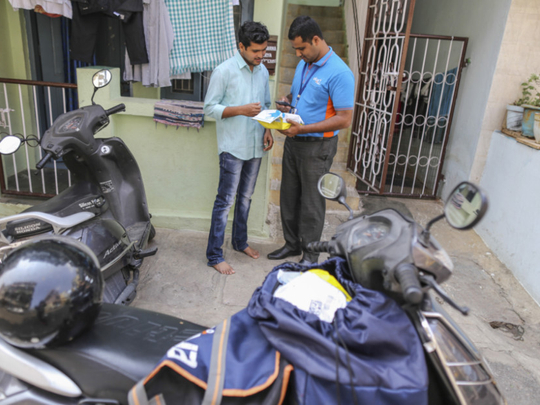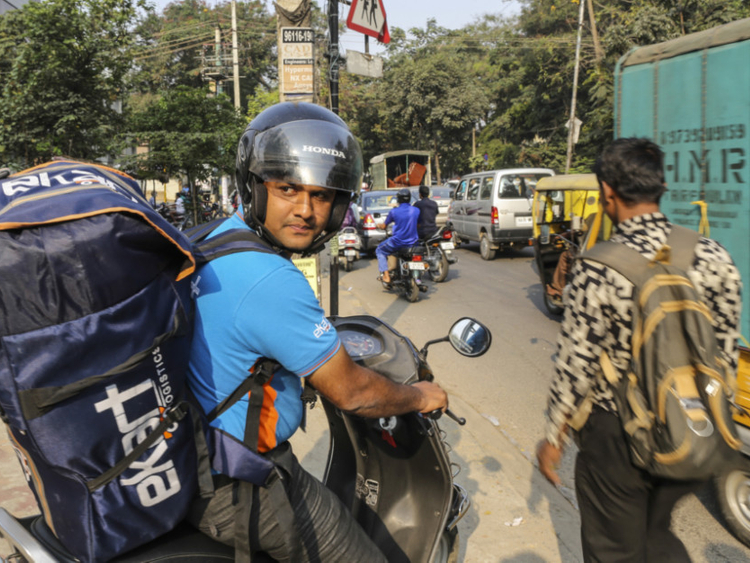
Bengaluru: Abdul Saleem heaves a 25kg bag crammed with foot massagers, jeans, kitchen tools and sports shoes onto his shoulders. As he does every morning six days a week, Abdul Saleem straps on a helmet, straddles his Honda scooter and accelerates onto Bengaluru’s gridlocked streets.
Abdul Saleem delivers packages for Flipkart Online Services, India’s largest and most valuable e-commerce company. He and thousands of fellow deliverymen are foot soldiers in a hard-fought battle pitting Flipkart against domestic rival Snapdeal.com and US leviathan Amazon.com, all tussling for dominance in a market that Morgan Stanley expects to explode more than tenfold to $137 billion (Dh503 billion) by 2020 from $11 billion in 2013. Flipkart is clinging to a narrow lead as Amazon pours billions of dollars into India.
Online merchants worldwide, competing to deliver packages in a day or less, are keen to close the so-called last mile. In developed markets, purchases are typically delivered by truck, and there’s talk of using drones to get the job done. In the chaotic cities of India and other emerging markets, companies do whatever it takes to get packages to customers - by foot, bicycle, even boat.
Risking their lives
For the most part they rely on people like Abdul Saleem, who has been weaving his scooter around Bengaluru since closing a money-losing scrap metal business two years ago. During the Diwali shopping rush, Flipkart’s army of 20,000 deliverymen carried as many as 800,000 packages a day. Without deliverymen risking their lives to get the products to the front door, sales growth at Flipkart, Snapdeal and Amazon would grind to a halt - much like Bengaluru traffic.
Abdul Saleem’s title is Wishmaster — a nod to his dual role as a kind of deliveryman-customer rep. Abdul Saleem usually deals directly with shoppers because many belong to extended families where someone is almost invariably home. Sometimes they’re happy to see him; other times they’re pacing impatiently outside, awaiting their retail fix.
Bengalureans and other urban Indians have become just as addicted to online shopping as their counterparts in New York, London or Hong Kong and are known to order multiple times a day - even if it’s a Rs250 (Dh13.61) kitchen knife they could buy easily from a local shop. “Who would want to brave the rush at the market when everything comes to the door?” Abdul Saleem asks.
At 6am on this sun-drenched Wednesday, Abdul Saleem is standing amid thousands of packages in neat rows in a teeming distribution centre in the upscale JP Nagar residential neighbourhood. On the walls are posters forbidding Wishmasters from sporting gelled hair, ripped jeans, open-toed footwear, moustaches that cover the upper lip and more than two rings on their fingers. Those who violate the code get a warning and a grooming kit. Wearing an orange-trimmed blue company shirt with blue jeans, Abdul Saleem at 33 is the second-oldest deliveryman at the centre.
The assembled Wishmasters huddle, their manager recapping a zero-tolerance policy on misbehaving with women, talking rudely to customers and stealing goods or cash; reports of deliverymen dropping off bricks instead of iPhones and assaulting ladies home alone have cast a pall over the industry. Then the manager entreats them to drive safely. The 59 men — going door-to-door is considered unsafe for women — throw back tiny cups of sweet milky coffee from a steel dispenser near a sign that reads “Do not Spit” and hit the road.
Abdul Saleem has 36 packages, a relatively easy day. His first stop is a two-storey home on a quiet lane where the man of the house is dusting a Volks-wagen at the gate. He’s a paed-iatrician and the package is for his daughter, a 26-year-old software engineer with IT outsourcer Infosys.
“This customer gets several packages daily from Jabong,” says Abdul Saleem, referring to Flipkart’s fashion store. “She returns many of them, too.”
Abdul Saleem knows the buying habits of people on his customary routes as well as Flipkart’s algorithms and bots. “This customer bought a smartphone three months ago and it looks like he has just bought another one,” he says at his next halt.
For many young men who migrate from villages into the big cities, whizzing around on a motorcycle with an ID card lanyard is coveted blue-collar work. “It’s a fixed income and comes at the end of every month,” said Abdul Saleem, who earns Rs13,800 (just over $200), a median salary for a coveted job that pays about as well as working at one of India’s many call centres.
Flipkart and its rivals, already spending heavily on discounts and setting up warehousing and payments infrastructure, are also being forced to pay up for experienced deliverymen. It’s unexpectedly hard to find people with a smattering of English (a common denominator in a nation with dozens of local languages) and a driver’s licence who can use phone navigation and process credit-card payments.
Poaching from pizza chains and courier companies is rampant, says Vir Kashyap, co-founder and chief operating officer at Babajob, India’s largest blue-collar job website.
It’s dangerous work in a nation where more than 146,000 people were killed in road crashes last year. Deliverymen brave rain and sweltering heat, breathing polluted air as they dodge erratic drivers, potholes, vending carts, street dogs and the occasional stray cow — all while carrying loads the size of a small refrigerator.
Today, Abdul Saleem’s scooter drives into streets too narrow for a car to enter. As three-wheel autorickshaws and recklessly piloted buses roar past, he leans on his horn every few seconds. Just days earlier, a new deliveryman was knocked off his motorcycle. Abdul Saleem, who says he maintains a sedate 40 kilometres, has had several close calls. (He pays for his own insurance.)
Many recruits quit while being trained, said Girish Jetty, a trainer at the JP Nagar centre. “They complain that they can’t ride while balancing their bag.” Others quit after a few months, saying the routes are difficult. Technology constantly tracks them on their routes and can tell if someone has claimed to stop by a home when they haven’t. The pressure is relentless. — Washington Post













